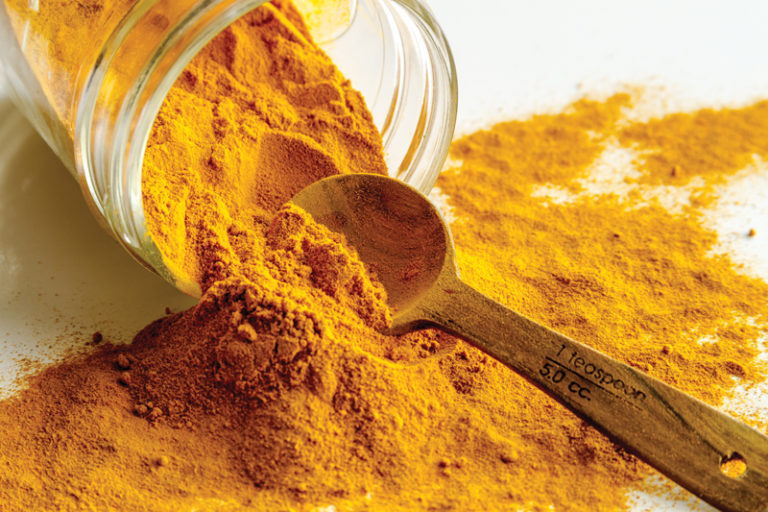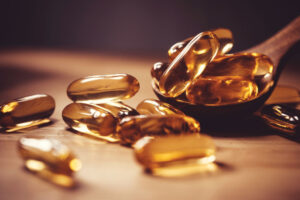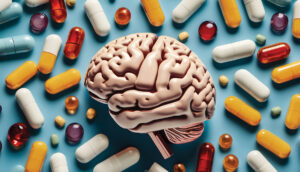The prevailing myth is that our intellect is in the driver’s seat, and, with strength of will, we can overcome mood. In fact, the opposite is true. Mood colors our perceptions and strongly influences our reactions. While it is true that, with effort, people can learn to better manage their moods and develop coping mechanisms, if the mood is strong enough, intellect alone is rarely enough. For example, if you are in a sour mood because your team just lost a game, you may well be able to talk yourself into a better place and put it in perspective. But if your mood is also fueled by neurochemical imbalances in the brain, and/or hormonal imbalances in the thyroid or adrenal gland, it becomes a much more complex and difficult situation.
Because of the myth that intellect trumps mood, people with serious mood disorders can be marginalized as weak or out of control. Mood disorders are diseases that impair thinking and behavior. Physical changes are occurring that disrupt normal brain functioning. Telling a person with depression to cheer up is like telling a person with a broken leg to get up and jog. They are physically incapacitated. Understanding the physiological basis of mood disorders improves treatment and reduces negative stereotyping.
Depression
As a practitioner, after evaluating for hormonal influences due to thyroid and/or adrenal dysfunction, my next consideration is what else might be interfering with proper brain function. Recent research has found that in depression, especially major depression, inflammation is a significant factor. Inflammation changes the nature of how cells interact with each other, how neurotransmitters function, how long brain cells work before they self-destruct, and how many new brain cells are created each day.
For decades, mind-body workers have argued that pervasive negative emotions, especially stress, create physiological changes in the body. Now mainstream research is validating and exploring those connections. Studies at Cork University Hospital and College in Ireland found that chemical stress responses from the hypothalamic-pituitary-adrenal (HPA) axis encourage the release of inflammatory cytokines that have a detrimental effect on the brain and behavior. This is a much more complex set of factors than the previous “brain chemistry only” model.
Unhealthy learned responses to stressors early in life can lead to a pattern that virtually guarantees inflammatory activity in the brain. For example, negative emotions often spur indulgence in unhealthy foods that give a fleeting sensation of pleasure. An unhealthy diet—including the lack of omega-3 fatty acids, healthy whole foods, and sources of high fiber—increases inflammation as junk food is ingested at ever higher levels. However, this is reversible with better eating habits. A study published in the American Journal of Clinical Nutrition found that men randomized to consume eight servings of fresh fruits and vegetables per day showed reduced levels of C-reactive protein compared to men with a low intake of carotenoid-rich foods.
Since stressors of various kinds elevate inflammatory markers, an effective natural intervention needs to include supplements that dramatically reduce inflammation that either can work in tandem with prescriptions or on their own.
Finding an effective, long-term and natural therapeutic agent—whether as a stand-alone or add-on therapy—has been difficult. While St. John’s wort (Hypericum perforatum) has solid studies supporting its use in cases of mild and moderate depression, it hasn’t been found as effective for those with major depressive disorder. However, current research has validated some supplements for antidepressant activity in more difficult cases.
The two supplements with some of the most compelling scientific investigation for reductions in inflammation and improvement in brain function are curcumin (extracted from the herb turmeric) and omega-3 fatty acids from fish—EPA and DHA.
Curcumin
Turmeric is an incredibly useful herb. It is an excellent spice used in yellow curries and many southeast Asian dishes. It is a natural dye, used for cloth and for foods. Turmeric also contains one of the most powerful natural medicines in the world—curcumin. Yet there is very little curcumin in turmeric—only about 2 to 5 percent of the spice is curcumin. That is why the important medical studies have focused on curcumin extracted from turmeric. It is virtually impossible to achieve medicinal levels of curcumin in the body using turmeric.
Curcumin has well-noted anti-inflammatory ability. It has been used to heal stress, mania and other depression-like conditions for centuries. Curcumin reverses the physical effects of stress and depression. It reduces inflammatory markers in the bloodstream that travel to the brain, and it prevents low levels of serotonin, noradrenaline and dopamine. Additionally, laboratory research shows that curcumin promotes neurogenesis (brain cell formation).
The research on curcumin and depression is escalating. In a search of the electronic database of the National Institutes of Health (NIH) Institute of Medicine, PubMed.gov, there are 77 studies found when searching for curcumin and depression. Interestingly, the studies using doses of 1,000 mg per day in studies of standard curcumin did not show much impact, but in studies of two types of enhanced-absorption curcumin, highly significant results were observed.
In a randomized, controlled clinical study of curcumin and individuals with major depressive disorder (MDD) compared the efficacy and safety of high absorption BCM-95 Curcumin (curcumin blended with turmeric essential oils to boost absorption) versus the prescription anti-depressant drug fluoxetine (one brand name is Prozac) was examined—alone and in combination.
The highest proportion of response, measured by the HAMD-17, was in the group using the combination of fluoxetine and BCM-95 Curcumin at 77.8 percent. Interestingly, the single-therapy groups scored almost exactly the same, with fluoxetine at 64.7 percent and BCM-95 Curcumin at 62.5 percent—numbers so close that the data is not statistically significant from one another.
There are two important conclusions from the result of this study. First, in this study, BCM-95 Curcumin worked as well as the prescription drug fluoxetine in terms of the measurable changes in the HAMD-17 score from baseline to six weeks of treatment. Second, this study provides the first human clinical indication that BCM-95 Curcumin may be used as an effective and safe treatment for patients with MDD without causing significant adverse effects. This study was quickly followed with two more published human studies on this type of curcumin and depression, validating the power to address MDD.
Another study looked at enhanced absorption curcumin with piperine, an extract of black pepper. The researchers did not compare this form of curcumin to antidepressant medication; instead, it was an examination of the power of curcumin to work with these drugs for enhanced effects in MDD. This six-week study used a dose of 1,000 mg curcumin/piperine per day and found that the group using both the herb and drug together had measurably better improvements in the level of their depression than the group using the drug alone.
Omega 3s
Omega-3s are critical to a healthy brain. DHA and phospholipids make up a great deal of our brain. The brain itself is about 60 percent fat—about 15 to 20 percent of is DHA. The brain needs phospholipids and DHA to develop properly and age well, so I think it is important to incorporate phospholipids with omega-3 fatty acids. Krill oil does this, as does a patented salmon extract from France developed by a process called vectorization. These fats help protect the brain and the way it functions. Consider this in-vitro study published in the Journal of Neurochemistry, for instance. In it, researchers pre-treated neuronal cells with DHA from a salmon-sourced phospholipid-bound omega-3 for 48 hours before exposing these cells to soluble oligomers of amyloid-beta peptide, which are known to cause the brain cell damage associated with Alzheimer’s and other brain disorders. DHA greatly increased neuron (brain cell) survival and reduced damage. The researchers concluded that “such neuroprotective effects could be of major interest in the prevention of Alzheimer’s and other neurodegenerative diseases.”
There are many studies showing the importance of omega-3s, brain health and mood:
• An Australian review found that DHA improves the blood flow in the brain when you perform cognitive tasks, regulates the way that blood sugars are used in the brain, and reduces inflammation and oxidative stress.
• A German study is investigating the deficiencies of omega-3s in elite endurance athletes, where the cardiovascular system takes an extreme workout, and where keeping positive mental outlooks are crucial to performance.
• Italian clinical study examined the effect of omega-3s on quality of life, phospholipids profile, and effects on depression in elderly female volunteers. At the end of only eight weeks, the participants reported significant improvements in depression and overall quality of life. Since the omega-3s modified the phospholipid profiles in the brain, it follows that having phospholipids as part of your omega-3 supplementation can offer important support in depression and other mood disorders.
• A Portuguese study found that the natural layer of phospholipids in the brain is altered by chronic, unpredictable stress, (as are glutathione ratios). The researchers concluded that phospholipid levels may be used as markers of depression, because of the way they physically affect the brain. In similar research at Columbia University, researchers found that low DHA levels tended to correspond with increased anxiety levels and negative mood.
There are a variety of ways to deliver omega-3 fatty acids besides eating more cold water, fatty fish. There are many brands and types of krill, fish, and calamari (squid) oils, as well as the salmon vectorization process mentioned earlier. Of these, only krill and a vectorized salmon extract also provide the much needed phospholipids necessary for brain health, though all deliver EPA and DHA.
About one in 10 Americans report symptoms of depression, and the causes can be as varied as the individuals reporting them. Some integrative physicians believe that the epidemic of inflammation in the U.S. due to a variety of factors is behind the increased incidence of many kinds of mood disorders, especially depression. Unfortunately, many of the current therapeutic drugs for depression may only be effective and safe in the short term. When taken long term, these medications may cause sedation, weight gain, loss of libido and/or sexual pleasure, and even physical sensations of numbness or pain. Finding natural interventions that together create and effective protocol for depression should be the first step in regaining the energy, focus and happiness lost to these devastating mood disorders.
However, remember that depression is a serious, sometimes life-threatening, mood disorder and people with depression should seek the advice of a professional to help them develop a protocol that works for them. This is especially true of individuals considering suicide or self-harm. It only takes a moment’s lapse into despair to commit suicide, and pausing and talking to someone can sustain a person until they can get help. If any of you are experiencing this level of pain, please know that as your brain heals, you will feel better. If you need help, the National Suicide Prevention Lifeline is staffed 24 hours a day, seven days a week with both English and Spanish speakers. That number is (800) 273-8255, or www.suicidepreventionlifeline.org. VR
References:
Sanmukhani J, Satodia V, Trivedi J, Patel T, Tiwari D, Panchal B, Goel A, Tripathi CB. Efficacy and Safety of Curcumin in Major Depressive Disorder: A Randomized Controlled Trial. Phytother Res. 2013 Jul 6. doi: 10.1002/ptr.5025.
Panahi Y, Badeli R, Karami GR, Sahebkar A. Investigation of the efficacy of adjunctive therapy with bioavailability-boosted curcuminoids in major depressive disorder. Phytother Res. 2015 Jan;29(1):17-21. doi: 10.1002/ptr.5211. Epub 2014. Aug 4.
Lopresti AL, Maes M, Maker GL, Hood S, Drummond PD. Curcumin and major depression: A randomised, double-blind, placebo-controlled trial investigating the potential of peripheral biomarkers to predict treatment response and antidepressant mechanisms of change. European Neuropsychopharmacology. Dec. 5, 2014.
Lopresti AL, Maes M, Maker GL, Hood S, Drummond PD. Curcumin for the treatment of major depression: A randomised, double-blind, placebo controlled study. J Affect Disord. 2014;167:368-375.
Watzl B, et al. A 4-wk intervention with high intake of carotenoid-rich vegetables and fruit reduces plasma C-reactive protein in healthy, nonsmoking men. Am J Clin Nutr. 2005;11:1052–1058.
O’Connor TM, O’Halloran DJ, Shanahan F. The stress response and the hypothalamic-pituitary-adrenal axis: from molecule to melancholia. QJM. 2000;93(6):323-33.
“Depression.” Available at: www.cdc.gov/features/dsdepression/. Accessed: June 3, 2015.
Overstreet DH, Keung WM, Rezvani AH, Massi M, Lee DY. Herbal remedies for alcoholism: promises and possible pitfalls. Alcohol Clin Exp Res. 2003 Feb;27(2):177-85.
Goel A, Kunnumakkara AB, Aggarwal BB. Curcumin as “Curecumin”: from kitchen to clinic. Biochem Pharmacol. 2008 Feb 15;75(4):787-809.
Hatcher H, Planalp R, Cho J, et al. Curcumin: from ancient medicine to current clinical trials. Cell Mol Life Sci 2008;65:1631-1652.).
Kulkarni S, Dhir A, Akula KK. Potentials of curcumin as an antidepressant. Scientific World Journal. 2009;9:1233-41.
Xu Y, Ku BS, Yao HY, Lin YH, Ma X, Zhang YH, Li XJ. Antidepressant effects of curcumin in the forced swim test and olfactory bulbectomy models of depression in rats. Pharmacol Biochem Behav. 2005;82(1):200-6.
Li YC, Wang FM, Pan Y, Qiang LQ, Cheng G, Zhang WY, Kong LD. Antidepressant-like effects of curcumin on serotonergic receptor-coupled AC-cAMP pathway in chronic unpredictable mild stress of rats. Prog Neuropsychopharmacol Biol Psychiatry. 2009;33(3):435-49.
Florent S, Malaplate-Armand C, Youssef I, et al. Docosahexaenoic acid prevents neuronal apoptosis induced by soluble amyloid-beta oligomers. J Neurochem. 2006 Jan;96(2):385-95.
Rice SM, et al. Youth depression alleviation: the Fish Oil Youth Depression Study (YoDA-F): A randomized, double-blind, placebo-controlled treatment trial. Early Interv Psychiatry. 2014 Aug 13. doi: 10.1111/eip.12166. [Epub ahead of print].
von Schacky C, Kemper M, Haslbauer R, Halle M. Low Omega-3 Index in 106 German Elite Winter Endurance Athletes – A Pilot Study. Int J Sport Nutr Exerc Metab. 2014 Sep 8.
Rondanelli M, et al. Long chain omega 3 polyunsaturated fatty acids supplementation in the treatment of elderly depression: effects on depressive symptoms, on phospholipids fatty acids profile and on health-related quality of life. J Nutr Health Aging. 2011 Jan;15(1):37-44.
Faria R, et al. Alterations in phospholipidomic profile in the brain of mouse model of depression induced by chronic unpredictable stress. Neuroscience. 2014 Jul 25;273:1-11.
Liu JJ, et al. Omega-3 polyunsaturated fatty acid (PUFA) status in major depressive disorder with comorbid anxiety disorders. J Clin Psychiatry. 2013 Jul;74(7):732-8. doi: 10.4088/JCP.12m07970.
Cheryl Myers is an integrative health nurse, author, and an expert on natural medicine. She is a nationally recognized speaker who has been interviewed by the New York Times, Wall Street Journal and Prevention Magazine. Her many articles have been published in such diverse journals as Aesthetic Surgery Journal and Nutrition in Complementary Care, and her research on botanicals has been presented at the American College of Obstetrics and Gynecology and the North American Menopause Society. Myers is the head of Scientific Affairs and Education for EuroPharma, Inc. www.europharmausa.com.




![[Sponsored Video] Special Report: Bergamonte®, the Untold Story](https://vitaminretailer.com/wp-content/uploads/2023/06/sponsored-video-special-report-b-300x169-1707947265.jpg)







